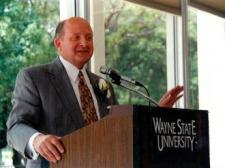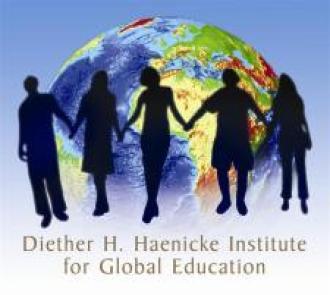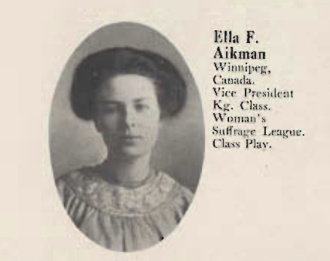The Institute is comprised of professional staff and faculty who oversee several aspects of the University's internationalization efforts, including:
- International Student and Scholar Services (I3S)
- The Center for English Language and Culture for International Students (CELCIS)
- Study Abroad
- Fulbright, External Scholarships and Faculty Engagement
- The Global Engagement Program (GEP)
- Asian Initiatives
HIGE is led by an associate vice president who reports directly to WMU's Provost and Vice President of Academic Affairs. Institute staff work closely with the International Education Council of the WMU Faculty Senate, as well as with various units and colleges across campus.
The Institute is named after Dr. Diether H. Haenicke, president emeritus and distinguished professor emeritus. A lifelong advocate of study abroad programs and international student success, Dr. Haenicke's passion for global learning was celebrated in 1998 when the University gathered its international operations under one umbrella organization: The Haenicke Institute for Global Education.
The Haenicke Institute for Global Education Mission
Western Michigan University will attain premier global status as a university when it regularly and continually generates and disseminates knowledge of the world outside the United States such that all of its graduates are competent and empathetic participants in the world, wherever they may find themselves while students and for the remainder of their lives.
The Diether H. Haenicke Institute for Global Education will provide leadership as well as academic, professional, managerial and, when appropriate, financial support to the University—its faculty, staff and students—toward the attainment of this goal.
Through collaborative engagement with the global community, the Haenicke Institute seeks to advance mutual respect within and across cultures and to promote human well-being throughout the world. Within this comprehensive vision, the Haenicke Institute will:
- Create at WMU a global community of scholars by striving to internationalize each member of the Western Michigan University faculty, recognizing this as the only effective strategy to ensure every student will acquire the knowledge and perspectives requisite for responsible global citizenship.
- Enrich that global community of scholars by hosting students and scholars from around the world and encouraging them to participate widely in appropriate courses of study, research or other collaboration with the faculty and students of Western Michigan University.
- Support and encourage students, who (a) undertake the global studies major or minor, (b) participate in study abroad or work abroad programs, (c) express interest in global and international studies through clubs and extracurricular activities, or (d) otherwise make known their interest in and commitment to global understanding. Help these students to excel in their studies and explorations of the world as our future generation of global leaders.
- Seek means to inform the campus community, the community at large, the state of Michigan, and the greater University community throughout the United States.
Haenicke Institute for Global Education Facts
- WMU was the first American university to require all students to include study of the non-Western world in their degree programs. The University prioritizes internationalization in its strategic plan.
- Currently, more 11,000 students are engaged in global activities or courses on campus.
- The WMU faculty includes more than 200 scholars with academic or research experience outside the United States. These professors engage actively in collaborative inquiry with scholars, professionals and specialists spanning the globe.
- The Haenicke Institute administers more than 100 official partnerships between WMU and educational institutions around the world.
- WMU supports nearly 2,000 international students on campus and abroad from 95 countries.
- Nearly 1,100 of Western’s international students study at one of WMU’s campuses, while the remaining 790 are enrolled in unique programs overseas, such as the Western Michigan Institute at Guizhou University of Finance and Economics (GUFE). The GUFE program, located in southwest China, offers students the opportunity to earn a business degree from WMU while studying abroad.
- The University also supports the post-degree career training and occupational practice of some 400 recent international alumni each year.
- There are 140 international scholars and 220 international spouses and children in our global campus community.
- More than 450 students, faculty and staff travelled last year on one of 80+ WMU Study Abroad programs. Travel experiences are planned to 30 countries, on average, each year.
- The institute is the beneficiary of $7.5 million in endowments used to advance the internationalization of the University mainly through student scholarships and financial-aid.
- Approximately $1.3 million was provided last year in scholarships for international students; an additional near $500,000 was provided in scholarships for study abroad.
- WMU has supported 86 Fulbright grant recipients since its first award in 1949. It is also a temporary home to dozens of Fulbright foreign students and scholars each year.
Haenicke Institute for Global Education History
Western Michigan University has a rich history of international involvement, dating back to 1911 when it awarded its first degree to an international student. The story begins with Miss Ella Aikman from Manitoba, Canada. According to A Pioneer Student at Western Michigan University by W. Wilson Woods, former associate dean of the Haenicke Institute, Aikman’s journey to WMU was remarkable.
Although the exact details of her travel from Winnipeg to Kalamazoo remain unknown, the trip likely took at least three days of Great Lakes ship travel and rail transportation from Chicago.
"Higher education for women was rare, and 'going off to school,' especially in a foreign country, must have been a source of wonder for her friends and family," writes Woods. "But Ella was an exceptional woman. She had already completed a year of higher education at Manitoba College when she chose to specialize in a relatively new field—kindergarten education."
"In 1910, only 30 percent of the U.S. population had attended elementary school, and just a third of those graduated from high school. The growing population and demand for a literate workforce led to the creation of institutions like Western State Normal School, which focused on training teachers for elementary and secondary education."
Aikman completed her degree in June, 1911, and remained in Kalamazoo for another year before returning to Canada. She later published a report in the Western Herald reflecting on her first year as a teacher, underscoring her dedication to early childhood education. “Kindergarten is the right of every child,” she wrote. “... providing such training for children from needy homes is bringing sunshine to dark gardens and making roots grow which one day will yield plants ...’”
Aikman’s story is just one of many. Today, with the establishment of the Haenicke Institute for Global Education (HIGE) in 1998, WMU supports nearly 2,500 international students and recent alumni at home and abroad, offering immigration assistance, student success services and post-graduation job training. It hosts 80+ study abroad programs and brings students, faculty and staff to 30 countries, on average, each year. From fostering academic opportunities to showcasing cultural events and providing K-12 outreach, the Haenicke Institute promotes learning that transcends borders and takes you wherever you want to go.
1911: Western Normal School, now Western Michigan University, grants its first degree to an international student.
1945: The University’s launches its first study abroad program.
1949: A WMU student was awarded the University’s first Fulbright award for research in France.
1961: The University begins establishing exchange relationships with international institutions.
1975: The Center for English Language and Culture for International Students is founded.
1987: WMU opens its first transnational education, or twinning program, with Sunway University Colleges in Kuala Lumpur, Malaysia.
1998: The Diether H. Haenicke Institute for Global Education (HIGE) is established by the WMU Board of Trustees to create and sustain an environment which facilitates the global engagement of the WMU community.
2006: The Michitoshi Soga Japan Center is created to promote research and advance knowledge about Japan among students, scholars, the general public and government, community and corporate leaders.
2010: The Timothy Light Center for Chinese Studies is created to enhance the work of faculty and graduate researchers with expertise and research interests in Sinology.
2017: The Western Michigan Institute, Guizhou University of Finance and Economics (GUFE) is established to enable students from the university in China to earn a Bachelor of Business Administration from the Haworth College of Business.
2018: The Haenicke Institute forms the Global Engagement Program (GEP) to support student engagement in campus events and curriculum with embedded global perspectives and international programming. Students build cross-cultural competencies and earn one of three GEP statuses: Global Bronco, Global Explorer or Global Citizen.
About the Haenicke Institute for Global Education
Your journey at Western Michigan University is a global one. Through transformative events, immersive classes and Experience-Driven Learning, the Haenicke Institute for Global Education connects Kalamazoo to the world—and the world to Kalamazoo. We assist more than 2,000 international students and alumni at home and abroad with admissions, immigration support, student success and post-graduation job training. We host 80+ study abroad programs and bring students, faculty and staff to 30 countries, on average, each year. From fostering academic opportunities to showcasing cultural events and providing K-12 outreach, the Haenicke Institute promotes learning that transcends borders and takes you wherever you want to go.











